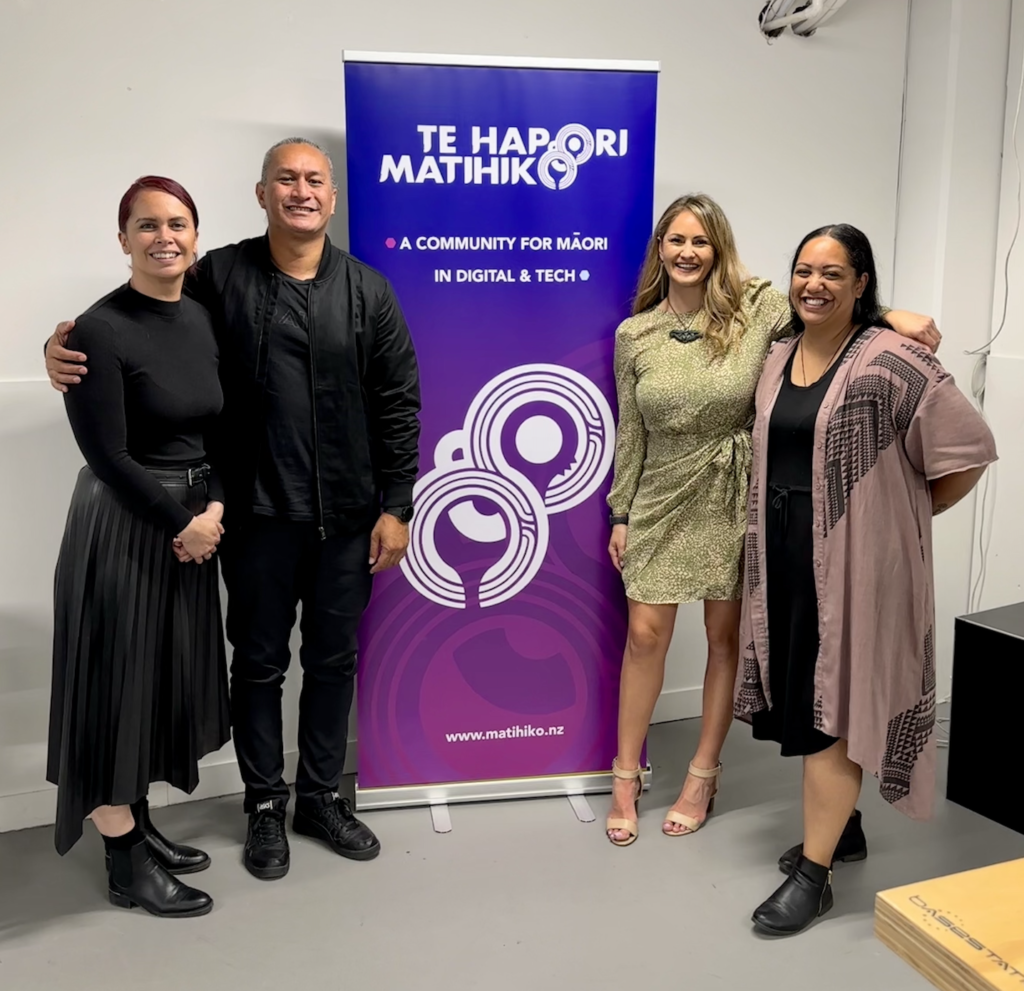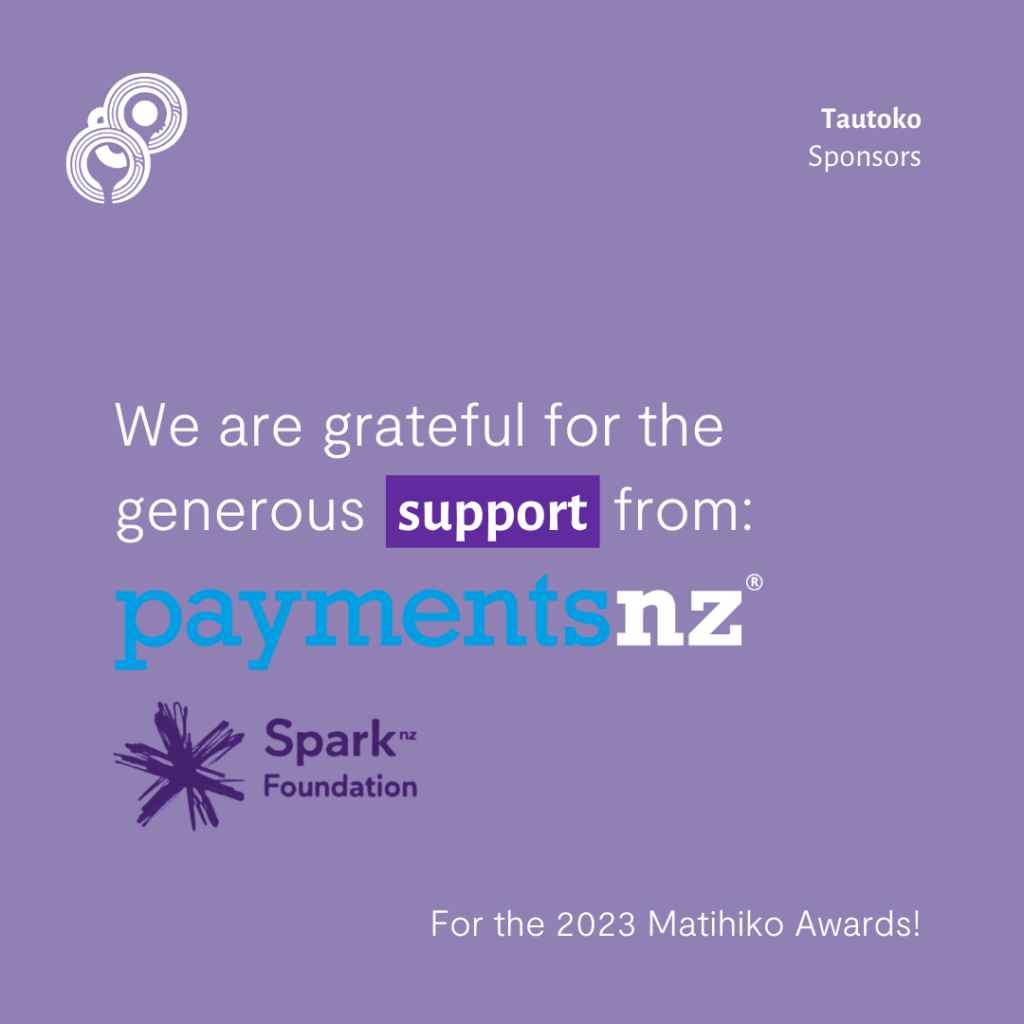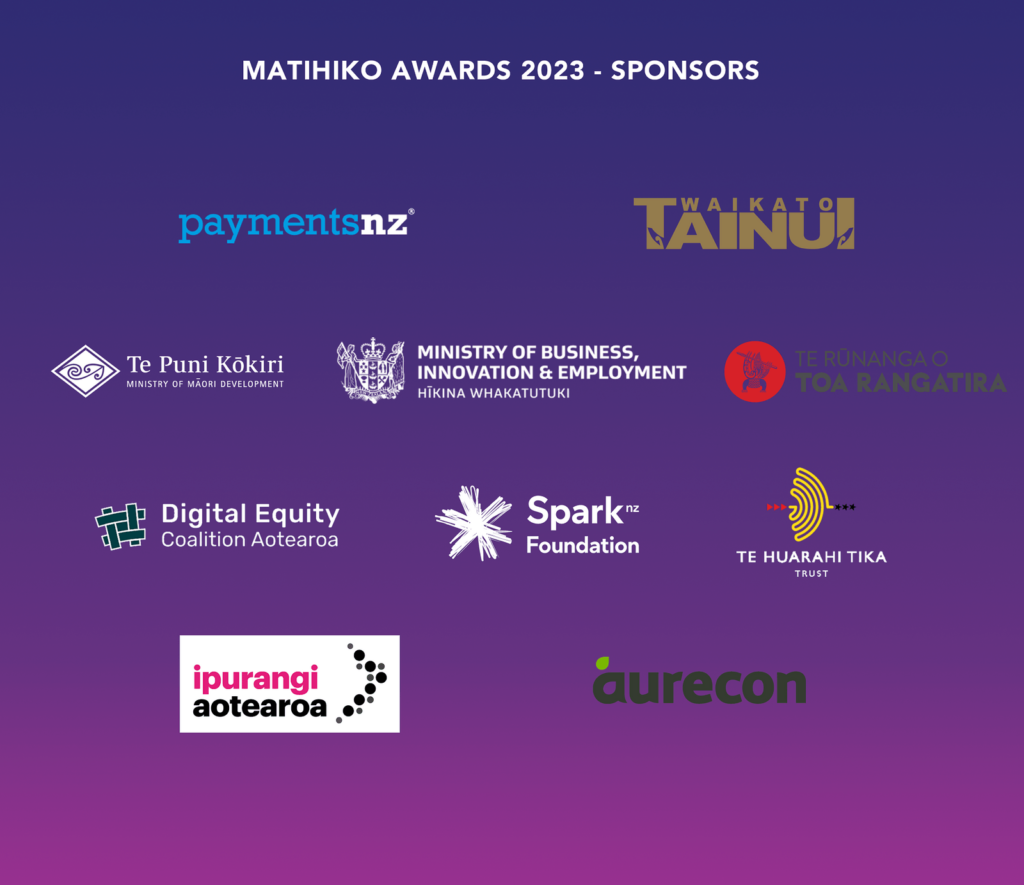For our second Mātauranga Session, we were joined by experts Kahurangi Malcolm (Managing Director of Puna Awarau) and Renata Hakiwai (Managing Director of HTK Group). They led an awesome session full of gems!
Pātai 1: Who you are, where you’re from, where you’ve worked and where you’re working now.
Kahurangi Malcolm:
I’m Kahurangi Malcolm and I’m one of the Managing Directors of Puna Awarau, which is a consultancy firm working at the forefront of indigenous procurement in Aotearoa. We’ve set up this consultancy, because we know that procurement is a powerful lever to create Māori outcomes and to empower our Māori businesses. And if we can open up supply chains, open up contract opportunities, open up pathways for our Maori businesses to get in without big organisations that are procuring and spending money every day, then we can boost our Maori businesses, we can boost our Maori whānau and we can boost the Māori economy.
“To change health outcomes, we need to focus on how we change wealth outcomes”
“using procurement as a lever to support our Māori businesses to create grassroots outcomes.”
Renata Hakiwai:
Kia ora, I’m Renata Hakiwai and I’m the Managing Director for HTK Group, a professional services organisation with a mission to accelerate Māori businesses. It’s a large enterprise and also a two-to-four government provider. We work with businesses and organisations right across the spectrum. We’re a group of 16 professionals supporting Māori businesses and indigenous businesses, across the likes of Taiwan, Canada, and Australia. We help pakihi realise their own aspirations and potential.
Pātai 2: Why is Māori procurement a good thing for Aotearoa?
Kahurangi Malcolm:
There are three things; I call it the triple ripple effect. One is the impact that Māori businesses have directly on their funding and being able to create that household wealth and intergenerational wealth. Research shows that Māori businesses have a higher income on average than Māori employees. So, if we can create more Māori business owners, start-up more Māori businesses and support them, then we can drive that household wealth into our whānau, so this direct impact on whānau is the first ripple effect. The second ripple effect is the wider impact that they have on the hapū and Iwi. We know that Māori businesses hire three times more Maōri than the national average. So they create additional employment outcomes, which impacts the wider whānau, hapū, community and Iwi.The third ripple effect is the impact they have on the broader Māori economy. The Māori economy is worth something like $70 billion. A lot of people think that’s tied up in Iwi settlements and in Iwi money but it’s actually in whānau businesses. In fact, 89% of our Maori asset base is held in the hands of our whānau owned businesses and those that are self-employed. If we want to grow the Māori economy, we have to invest, grow and tautoko our Māori businesses.
“You can see the inherent impact that Māori businesses have in the way that they embed Māori values, and live and breathe them on a daily basis”
“Our whānau owned businesses are the backbone of the Māori economy.”
“89% of our Maori asset base is held in the hands of our whānau owned businesses and those that are self-employed”
Renata Hakiwai
For me, it’s about bottom-line outcomes that you can get from procuring from Māori businesses. With Māori businesses, we seem to hire our own people for jobs, which is a good pathway to wealth creation. We create jobs for our whānau, so there are follow-on social outcomes, putting bread and butter on the table.
Pātai 3: What funding and pūtea is available for Maori and Maori businesses?
Kahurangi Malcolm
A quick disclaimer here.. Please look at each organisation’s website.The criteria and process is different for each one. One place that’s really good and has been around for a long time is Poutama Trust. They do different funding for capital equipment, up to a certain amount, as well as capability development, and they have a 50/50 arrangement for those. So, if you’re looking for support around business planning, financial forecasting or marketing or those types of things, where someone coaches you to do it, they can provide 50/50 funding and that’s the same for any regional business partner provider. Regional Business Partners are a different organisation in each rohe that administers that same funding. There’s also Callaghan Innovation funding for new innovative ideas. They’ve got Getting Started grants, which are kind of pilot innovations all the way up to the bigger innovations but again, it’s 60/40. So you pay 60%. Māori Women’s Development Inc do low interest loans for those that can’t or don’t want to get a loan through the bank. There’s Te Puni Kokiri that do different grants around Māori capability and development and some Iwi also offer grants. I know Waikato/Tainui offer help with startups, which is a really rare thing to find. It was really hard to find grants for the startup space because it’s quite high risk for organisations.. Then there’s Māori business accelerators like Kokiri and other mainstream accelerators. Kokiri focuses specifically on Māori businesses and gives them mentoring and wraparound support and sometimes, a cash injection, but there are other accelerators like Sprout in Taranaki and they focus specifically on agri and food businesses. And then there’s Sodar that’s an incubator accelerator function. There’s Akina that does impact readiness and investment funding for those that are looking for further investment and they have an impact focus. There’s lots of funding!
All have different criteria and different processes. And some can be really time consuming. Some will ask for your business plan, your financial forecast and much more and others may just be a kōrero, a quote and we’ll go from there. But I think for any businesses looking for business support, it’s understanding why you’re going for different grants and what benefit they will provide your pakihi. Is it going to be worth the time and energy you’re putting into going for that funding in the first place? It can be really time confusing and can feel like you’re giving a lot and not receiving much in return. If you’re a charitable organisation, there’s a really great platform called Gem Local and that gives you all the philanthropic funding that comes out and the deadline, you receive notifications and that’s a really helpful tool if you’re in the charity space. And then on the procurement side of things, we have Amotai, which is an organisation that connects buyers with Māori businesses. There’s also GETS which is the government’s electronic tendering service where the government puts up all their contracts and Tenderlink is also another one, although smaller councils tend to use that one. It is really challenging to navigate if you’re coming into this space for the first time and you haven’t to do it before.
“I think for any businesses looking for business support, it’s understanding why you’re going for different grants and what benefit they will provide your pakihi”
Renata Hakiwai
Every government agency has support for businesses in one way or another.It’s just a matter of what you’re looking for. In the startups space, there’s us – HTK group and we run three accelerators and incubators, so there’s opportunities there. We’re also a Callaghan Innovation provider. We also run a venture capital fund and for those who are in the startup space, venture capital is another way of raising capital. For those who don’t know what venture capital is, it’s when you’re seeking investment from a fund, a firm or even an angel investor and they become a part of your journey for equity or sometimes through venture debt. There’s private equity funds, so if you’re an established business and looking to scale, there are private equity firms out there that can help fund or can become a part of your journey. It’s important to remember that the difference between private equity and venture capital is that venture capital is focused on high growth, global scale and reach and generally focused on businesses in their startup or early stages, whereas private equity really focuses on businesses that are already established and looking to grow. Those are two avenues to explore with regards to funding or raising capital.
“Every government agency has support for businesses in one way or another.It’s just a matter of what you’re looking for”
Pātai 3: If people in this group want to get started, what kind of things should they consider and what should they start getting together to be able to apply for funding or to go for some of those big contracts?
Renata Hakiwai
I’d say, if you’re looking to raise capital or you’re going for funding, to have all your ducks in a row and that you have your business plan, your strategy in place and that you have a clear line of site as to what you want to do and what you want to achieve and where you’re going. This just makes the process easier, depending on what process it is. Government processes can be pretty horrible to navigate, especially if you’re constrained for time or if you’re a one-man operated business. Another thing, when you’re going to look for funding, my advice is not to go out with your hand out and to actually ask for advice. Generally when you ask for advice, it comes with funding but the last thing you want to do is go out with your hand out and be disappointed when you’re shut down.
“have a clear line of site as to what you want to do, what you want to achieve and where you’re going”
Kahurangi Malcolm
I think it’s important to understand why you’re going for funding. When I was administering funding grants myself, a lot of people where there because they had heard that they could get pūtea but they didn’t understand why they wanted it, what it would be good for, what the criteria of the fund was and that it wasn’t just free pūtea for all. So understanding exactly why you need pūtea and for what part, and figuring out whether it is going to be worth your while to go for those opportunities. Advisors can often recommend other or better options outside of what they can provide, so going with an open mind and the ability to listen and to take in what others have to say is really important.
“understanding exactly why you need pūtea and for what part, and figuring out whether it is going to be worth your while to go for those opportunities”
“Advisors can often recommend other or better options outside of what they can provide, so going with an open mind and the ability to listen and to take in what others have to say is really important.”
Renata Hakiwai
I find it more palatable, from the other side of the fence, is if you’re coming in with skin-in-the-game and what I mean by that is, that you’re contributing something, like coming to us and saying “I have 20% and I need support” or if there are other contributions to what you’re trying to raise because what we see is the risk. So, say you’re looking to raise $10 and you’re asking for the full $10, that appears to be a lot more work and risk, whereas, if you’re looking to raise $10 but you already have $7, it’ll make the process easier because it’s de-risked.
Katie Brown
And having your financials ready to roll, as some of those funds and grants require you to have 2-years’ financials ready, so they’re quite good to have handy, from your accountant, as they’ll probably be required.
Pātai 4: What challenges do you see in the funding and procurement space and what can we do to navigate around them?
Kahurangi Malcolm
There’s heaps of challenges. One of them is just knowing what’s out there; It’s so challenging to navigate the system to find out what’s best for you and your pakihi. On the procurement side of things, the government procurement system can be a real pain and that’s why we’ve gone into the area that we’ve gone into, is to help organisations to break down some of those processes so they’re not so cumbersome on our pakihi Māori. From a supplier side, one of the things is looking at the weightings of an organisation or procurement process to see what they actually value because, often, if they’re talking about how much they want to engage and procure from Māori businesses but you look at their weighting and you find nothing to whakamana those values and whakaaro then you’ll know they’re likely to focus on lowest price. If it’s on GETS, it’s an open and competitive tender, whereas if they send you an invitation to a smaller process which is called a closed-tender, you’ll have a better chance at winning those contracts, or they can engage you with a direct award and that’s the best because you don;t have to go through those massive processes. Smaller levels of spend will often have thresholds and you’ll be able to engage with them, whereas a multimillion dollar project may need to go on GETS. So it’s important to understand what procurement you’re going for and what’s underneath those.
“the government procurement system can be a real pain and that’s why we’ve gone into the area that we’ve gone into, is to help organisations to break down some of those processes so they’re not so cumbersome on our pakihi Māori”
Renata Hakiwai
For those established businesses who are looking to grow and work in the government sector, it may be worthwhile trying to team up with a government provider. Our organisation is on a government provider panel for consultancy services and at a tier 2. What that has done for us as a business is that we no longer have to go on GETS and we go through a closed-tender process and often just an RFQ (request for quote). So if you’re looking to work with the government, I’d recommend looking at becoming a government provider and looking to get on those panels.
Audience Pātai
How do government distinguish tier-1 and tier-2 businesses?
Renata Hakiwai
Through the AOG process, they have their own criteria and that’s a mixture of things, including capability, capacity, turn-over and especially over the last 3-years. For example, in the consultancy space, a big firm like Delloites who likely has a huge turn-over, more than 300 staff, probably has multiple capabilities within their organisation, whereas they’ll have a different process for determining tiers for construction businesses.
Are there any business mentors for funding out there and how do we access them?
Kahurangi Hakiwai
There are mentors out there, such as Business Mentors New Zealand who are a network of volunteer Mentors who give their time. I do know that there is Height which is a Māori owned business and Te Puni Kokiri offers funding for them to support Māori businesses to go for procurement opportunities, like responding to RFPs and things like that, and building that tendering muscle because it is an art form and some people have employees dedicated to bid-writing as a full-time job. For lots of us who are owner-operators, we don’t have the capability to dedicate staff to do that so in that case, there’s Height who can support with that.
Renata Hakiwai
HTK Group does alot of mentoring and support around RFP writing but more so in the consultancy, professional services and innovation sector, so different to the likes of Height’s. It’s quite hard for those who are owner-operators, unless you have time but once you have your first or second underway, you have a basis for any other RFP and contracts that come up because after that, a lot of it becomes cut and paste.
Katie Brown
Te Puni Kokiri also has a Māori Business Growth Fund, so you can talk to your TPK regional advisor and they can help you to look at the criteria etc. A few hoops to jump through to get it but worthwhile going for that additional support.



